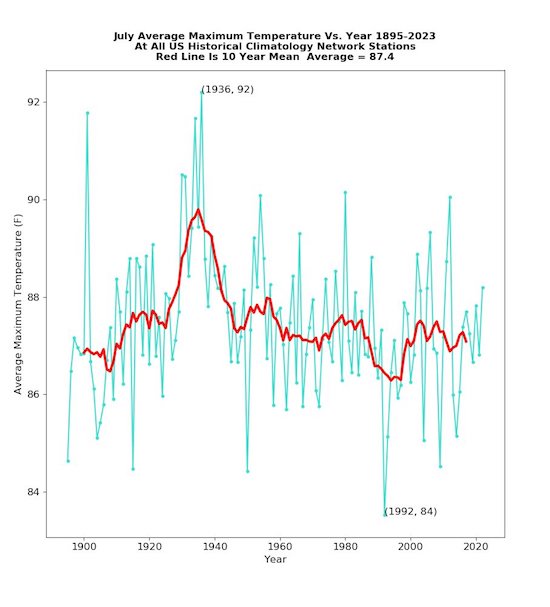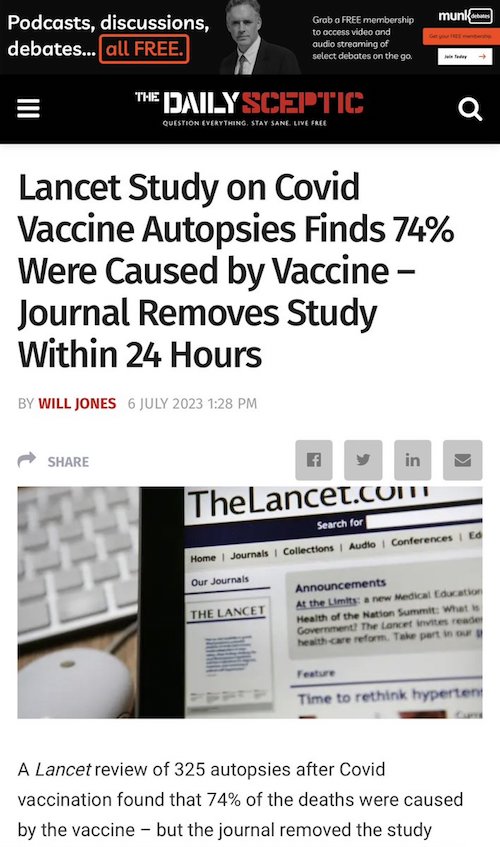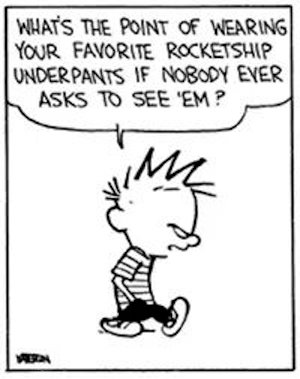
Camille Pissarro Rue Saint-Honoré in the Afternoon, Effect of Rain 1897

The keyboard Meta used to produce their new app, Threads.


Gal Luft
BREAKING — Israeli professor Dr. Gal Luft, the "missing witness" in the Biden corruption investigation, accuses the Bidens of receiving bribes from individuals linked to Chinese military intelligence and using an FBI mole named "One Eye" to share classified information with CEFC… pic.twitter.com/ADGC8pXTr8
— KanekoaTheGreat (@KanekoaTheGreat) July 6, 2023

Maersheimer
“The unipolar moment has gone.
There are now three great powers — US, China and Russia.
We (USA) have lost our soft power. People all over the world think that the United States acts like a thug.”
— Professor John Mearsheimer pic.twitter.com/lkhpNQy75K
— S.L. Kanthan (@Kanthan2030) July 6, 2023

The five hottest Julys in the US were 1936, 1901, 1934, 1930 and 1931.


@JimSteeleSkepti
The jet stream NOT CO2 is our weather control knob. Below is the satellite data from June 28, 2023 showing (above) the wavy behavior of the jet stream and (below) how the troughs coincide with cool temperatures and the ridges with heat domes and high temperatures. On the same dates the public was given very different weather news. Experts reported for Los Angeles under the jet stream’s trough: Records from Downtown Los Angeles, where records date back to 1877, show June 2023 being the coolest such month since 1965.
But in Texas, where the jet stream generated a heat dome, the news misleadingly reported: “Climate change has sent temperatures soaring in Texas” While along the east coast in Connecticut beneath a trough reported: “What’s behind Connecticut’s unusually cool weather in June — and what’s coming next?”



“He will insist on Ukraine being admitted to NATO so that NATO will then join the war against Russia…
• Zelensky Holding Out For NATO To Enter Ukraine Conflict – Lukashenko (TASS)
Ukrainian President Vladimir Zelensky will insist that Ukraine be accepted for NATO membership and that the bloc get directly involved in the conflict, Belarusian President Alexander Lukashenko said at a meeting with representatives of foreign and Belarusian media outlets. “He (Zelensky – TASS) will insist on Ukraine being admitted to NATO so that NATO will then join the war against Russia,” he said. According to Lukashenko, Zelensky has finally realized that he will not win the war, and so has gradually started making demands on those who pushed his country into it. The Belarusian leader noted that Zelensky’s demands would, above all, concern money and new weaponry. “By July 11 (the start date of NATO’s Vilnius summit – TASS), they [the NATO countries] will be expected to come up with something to demonstrate” support for Kiev, he said.

“American and European citizens are hardly ready to march in orderly rows to the hell into which the Zelensky government is dragging the entire planet.”
• Zelensky ‘Dragging Entire Planet’ To Hell – Russian Envoy (RT)
Faced with failure on the battlefield, Ukraine’s president is trying to drag NATO into the conflict with a false-flag attack on Europe’s largest nuclear power plant, Russia’s ambassador to the US, Anatoly Antonov, said on Thursday. “News reporters continue to pretend not to notice the obvious: from the very beginning of the special military operation, all the accusations of the Zelensky regime against us turned out to be sabotage operations of Kiev itself,” Antonov told Newsweek in an email interview. The difference now, he added, was that “this time stakes have grown substantially: Europe’s nuclear security is at risk.” Zelensky has accused Russia of planting explosives at the Zaporozhye Nuclear Power Plant (ZNPP). Antonov called it “absurd” to accuse Russia of wanting to damage the facility which it has controlled since March 2022.
Kiev’s “criminal intentions” divert attention from “the failed counteroffensive of the Armed Forces of Ukraine, in which the West has invested enormous resources,” to falsely accuse Russia as a ‘nuclear terrorist’ ahead of the NATO summit, and draw the US-led bloc into the conflict directly, Antonov said. “Western ruling elites should understand that the failures on the battlefield make Kiev eager to create a pretext for the deployment of the NATO contingent to Ukraine, thereby to inflate a regional conflict into World War III,” the Russian ambassador told Newsweek. “We call on the curators of the Kiev regime to exercise responsibility and exert influence on their ‘wards’ in order to avoid a large-scale catastrophe,” he added. “American and European citizens are hardly ready to march in orderly rows to the hell into which the Zelensky government is dragging the entire planet.”
International Atomic Energy Agency (IAEA) inspectors, who are on the ground at the ZNPP, reported on Wednesday that they have found no signs of any mines, either at the cooling pond – as Kiev initially claimed – or on the roofs of the reactor buildings. The IAEA observer mission was deployed to the ZNPP in September 2022. Prior to that, the station and its environs had been repeatedly targeted by Ukrainian artillery, which Kiev admitted at one point. Just before the IAEA mission arrived, Ukrainian commandos also attempted to seize the facility but were driven back. Russia has provided evidence of Ukrainian attacks to the UN, which has avoided assigning blame.

Bulgaria: “the nation’s new pro-European government – which was formed in early June – confirmed that it would continue to provide Ukraine with military equipment. ..”
• Kiev Dragging Other Countries Into Conflict – Moscow (RT)
Ukraine’s attempts to secure more foreign military aid and make other countries direct participants in the conflict will fail to change its eventual outcome, Kremlin Press Secretary Dmitry Peskov said on Thursday. Speaking to reporters, Peskov was asked to comment on Ukrainian President Vladimir Zelensky’s trip to Bulgaria, in which he intends to discuss further security assistance to Kiev. “The Kiev regime is doing its best to drag as many countries directly into this conflict as possible,” Peskov said, adding that some nations are already immersed in hostilities from head to toe. Peskov confirmed that he was not surprised such deliberations were taking place, noting that “fundamentally, all these discussions and their results are in no way capable of influencing the outcome of the special military operation.”
“The current frontline situation provides ample proof for that,” the spokesman added. He was referring to the ongoing Ukrainian counteroffensive that, according to the Russian Defense Ministry, has so far failed to gain ground despite being supported by a large amount of Western weaponry. Zelensky’s visit to Bulgaria comes after last week Sofia announced a new package of military aid to Kiev. While it stated that the new batch of military assistance would be “comparable in volume to the aid from the first package” granted last December by the caretaker government, it did not provide any details on its contents. The decision came after the nation’s new pro-European government – which was formed in early June – confirmed that it would continue to provide Ukraine with military equipment.
This stance, however, is not shared by President Rumen Radev, who earlier insisted that Bulgaria should refrain from supporting Ukraine with arms, arguing those policies would not be able to stop the conflict and would only damage the country’s economy. Sofia has been slow to provide Kiev with security assistance, largely due to opposition from the Bulgarian Socialist Party, with the gridlock removed only in December. However, a Euractiv report from October suggested that the Balkan nation emerged as one of the biggest indirect suppliers of military aid to Ukraine, having sent at least €1 billion of weapons and ammunition to Ukraine via brokers. Russia has repeatedly warned the West that weapons deliveries to Ukraine will only prolong hostilities and make it a direct participant in the conflict, without changing the outcome.

“The experience that Wagner and its commanders have, they’ll gladly pass it on to our military…. The ones that we need: in tactics, combat operations..”
• Lukashenko Outlines Deal With Wagner (RT)
Wagner troops could be used to defend Belarus after they relocate from Russia, where they took part in a failed revolt last month, President Alexander Lukashenko has said. Military personnel attached to Evgeny Prigozhin’s private military company are being transferred to the country subject to “certain conditions,” including that they can be deployed instantly if they’re needed to “defend the state,” he explained. “I’m absolutely not worried and not troubled that we’ll have a certain number of these fighters stationed here [in Belarus],” Lukashenko told journalists on Thursday. The likes of Polish President Andrzej Duda and his Ukrainian counterpart Vladimir Zelensky have vowed that “they won’t leave Belarus alone,” Lukashenko said, adding that “he must react” to such threats as supreme commander of the armed forces.
“The experience that Wagner and its commanders have, they’ll gladly pass it on to our military…. The ones that we need: in tactics, combat operations,” he continued. Wagner was instrumental in the capture of the strategic city of Artyomovsk (Bakhmut) from Ukraine in May. The PMC has also operated in Syria and Africa. When asked about the possibility of Wagner attempting a mutiny in Belarus like they did in Russia last month, Lukashenko replied: “I don’t think that Wagner will somehow rise up and turn its guns against the Belarusian authorities and the Belarusian state. Everything happens in life. But today I don’t see such a situation.” He also provided information regarding the whereabouts of Prigozhin, saying the Wagner head is currently not in Belarus, but in Russia, and that they had talked the previous day.
Kremlin Press Secretary Dmitry Peskov said on Thursday that the Russian authorities “don’t have either the ability or desire” to track Prigozhin’s movements. All of the statements made by Moscow and Belarus regarding the fate of Wagner in the wake of the failed mutiny “remain relevant,” he added. In a short message on social media earlier this week, Prigozhin claimed that the botched uprising by his men was aimed at “fighting traitors and mobilizing the society” of Russia. “I think we succeeded in many of those goals,” he claimed. The two-day insurrection by Wagner in late June was ended through talks between Lukashenko and Prigozhin in close coordination with Russian President Vladimir Putin. According to Moscow, it was agreed that the Wagner chief and his men who took part in the mutiny would avoid prosecution. As part of the deal, Prigozhin left for Belarus, with his men offered the choice of following him, signing contracts with the Russian military, or returning home.

“..the IMF played a key role in precipitating the 2014 crisis: Ukraine’s then-President, Viktor Yanukovych, refused to accept IMF demands that he cut wages, slash social spending and end gas subsidies in order to integrate with the EU..”
• The Capitalists Are Circling Over Ukraine (Fazi)
Two weeks ago, thousands of representatives from businesses and governments from across the world gathered in London to “support Ukraine’s recovery”. But was the gathering of all those Western corporate elites at the Ukraine Recovery Conference entirely altruistic? There are, after all, massive profit opportunities being created by the war. Last year, the Ukrainian government essentially outsourced the entire post-war “reconstruction” process to BlackRock, the world’s largest asset management firm. They signed an agreement to “provide advisory support for designing an investment framework, with a goal of creating opportunities for both public and private investors to participate in the future reconstruction and recovery of the Ukrainian economy”. In February, J.P. Morgan was brought on board as well.
The two banks will run the Ukraine Development Fund, which aims to raise private investment in projects potentially worth hundreds of billions of dollars across sectors including tech, natural resources, agriculture and health. BlackRock and J.P. Morgan are donating their services, but, as the Financial Times noted, “the work will give them an early look at possible investments in the country”. The opportunities are significant, particularly in the agricultural sector: Ukraine is home to a quarter of the world’s chernozem (“black earth”), an extraordinarily fertile soil, and before the war it was world’s top producer of sunflower meal, oil and seed, and one of the biggest exporters of corn and wheat. From certain perspectives, the war is clearly good for business: indeed, the greater the destruction, the greater the opportunities for reconstruction.
At Davos this year, Larry Fink, CEO of BlackRock, said he hoped the initiative would turn the country into a “beacon of capitalism”. David Solomon, CEO of Goldman Sachs, also spoke cheerily of Ukraine’s post-war future. “There is no question,” he said, “that as you rebuild, there will be good economic incentives for real return and real investment.” Seeing opportunity amid the tragedy, 500 global businesses from 42 countries have already signed the Ukraine Business Compact “to help realise its huge potential” — or secure their slice of the Ukrainian pie. “Most are standing on the sidelines for now, given the security threat,” the FT reported. “But there are already companies on the cusp of moving in — especially in the low-hanging-fruit industries of construction and materials, agricultural processing and logistics.”
Over the years, across a series of similar events, Western governments and corporate leaders have made no secret of their enthusiasm to use the post-Maidan regime — and now the war — to radically alter Ukraine’s political economy. The agenda: to open up the country and make it safe for Western capital by transforming it into a special economic zone. This neoliberal shock therapy should, in their view, include “strengthening the market economy”, “decentralisation, privatisation, reform of state-owned enterprises, land reform, state administration reform”, and “Euro-Atlantic integration”, as well as widespread “deregulation” and the slashing of “outdated labour legislation leading to complicated hiring and firing process, regulation of overtime, etc”. In short, the Washington Consensus on steroids.
This programme has, arguably, been underway since the mid-Nineties, when the West used IMF loans-cum-conditionalities to impose on Ukraine, just as it did on Russia, a series of radical free-market-minded reforms that crippled the economy. As the Indian economist Prabhat Patnaik has pointed out, the IMF played a key role in precipitating the 2014 crisis: Ukraine’s then-President, Viktor Yanukovych, refused to accept IMF demands that he cut wages, slash social spending and end gas subsidies in order to integrate with the EU, and turned instead to Russia for an alternative economic agreement. This was the backdrop for the Western-backed Euromaidan protests and, eventually, the 2014 regime change.

So he gets to “new friend” Bulgaria and what does he do?
“Zelensky “savaged” Radev and “opened up with both barrels” to “maul” the Bulgarian president, delivering his words “with measured scorn” and “barbed irony” as Radev “took refuge” in the sheet of paper in his hands.”
• Zelensky Clashes With Bulgarian President Over Weapons Demands (RT)
Bulgarian President Rumen Radev found himself lectured by his Ukrainian guest Vladimir Zelensky on Thursday, after telling him that Sofia had no weapons to spare for Kiev. As TV cameras documented their meeting, Zelensky attacked Radev for advocating a diplomatic solution to the conflict. “I do not agree to provide ammunition, especially from the Bulgarian army reserves,” Radev told Zelensky, according to one of the translations. “I continue to maintain that this conflict has no military solution and more and more weapons will not solve it.” Zelensky objected to Radev’s use of the term “conflict,” insisting that “this is definitely a war.” “God forbid, some tragedy should befall you and you should be in my place,” he added. “And if people with shared values do not help, what will you do? You would say: Putin, please grab Bulgarian territory?”
“I also want to tell you, whatever your army has in terms of munitions, it will not be enough to fight with the Russian Federation. You don’t have a bad army, your people are good but it would not be enough to fight against 160 million people. That is why it is good to give the people to defend themselves, so that the war does not come to you, to the Poles, to the Romanians – war knows no distance, I can tell you,” the Ukrainian leader told his host. “You cannot support Russia and support a balancing position because Russia wants to destroy NATO, wants to destroy Europe and the European Union; these are their goals. Do you get me?” Zelensky told Radev.
According to Politico’s description of the incident, Zelensky “savaged” Radev and “opened up with both barrels” to “maul” the Bulgarian president, delivering his words “with measured scorn” and “barbed irony” as Radev “took refuge” in the sheet of paper in his hands. The Bulgarian president eventually asked the cameras to leave the room. NATO countries have sent billions of dollars worth of weapons, ammunition and equipment to Ukraine since February 2022, while insisting they were not directly involved in the conflict with Russia. Earlier in the day, Zelensky met with the government of PM Nikolai Denkov, who has only been in office for a month. Denkov’s cabinet supports selling weapons to Kiev. The Ukrainian delegation departed Sofia for Prague, on board a Czech air force transport.

Ukraine has no money.
• Bulgaria Plans $650 Million Nuclear Sale To Ukraine – WSJ (RT)
Bulgaria is close to completing a deal to sell two Russian-made nuclear reactors to Ukraine’s state-owned energy company Energoatom for around $650 million, the Wall Street Journal reported on Thursday. Under the terms of the proposed deal, which has yet to be completed, Sofia’s energy firm NEK would sell the Ukrainian company two reactors from Bulgaria’s unfinished Belene Nuclear Power Plant. It would be the first time that Russian-designed nuclear equipment would be used to boost Kiev’s energy output, the WSJ said. The same publication also notes that two primary methods of payment for the reactors have so far been proposed. One would see the United States provide part of the funds to Energoatom as part of an aid package for Ukraine, which would subsequently be transferred to NEK.
Another option, the WSJ reported, would be for Sofia to assume a minority shareholding in Ukraine’s Khmelnytsky Nuclear Power Plant, where the reactors would be installed. Ukraine’s president Vladimir Zelensky arrived in Sofia for a one-day visit on Thursday, where it is expected that the nuclear deal will be discussed with Bulgarian officials. Also on Thursday, Sofia’s parliament passed a motion requiring its government to hold negotiations with Kiev regarding the sale of the nuclear equipment. The proposal has been slammed by pro-Moscow opposition parties in Bulgaria, who claim it was rushed through the legislature in order to obstruct any attempts to block it. The possible sale of the reactors further illustrates a European energy market in flux after the EU last year ended most of its imports of Russian oil, gas and coal in the wake of Moscow’s military operation in Ukraine. Prior to this, even Bulgaria relied on Russia for much of its gas supplies.
The still-uncompleted Belene Nuclear Power Plant has been the source of much controversy since the project was first undertaken in the mid-1980s. Construction at the site has been halted and resumed on several occasions, with some Western governments noting their opposition due to the proposed plant possibly being dependent on Russian fuel. It has also received objections from environmental campaigners, who claim that its location in a seismic active zone represents an unnecessary risk. For Kiev, though, the Soviet-designed Khmelnytsky power plant in Ukraine’s west already has technicians trained to operate the Russian-made reactors, potentially establishing new energy exports from Kiev to Europe. On Thursday, two pro-Russian parties in Sofia, the Socialist Party and Revival, a nationalist party, voted against approving the sale of the reactors to Kiev.

“On last year’s day of remembrance for Polish victims, the Ukrainian leader submitted a draft law to parliament which granted special privileges to modern-day Polish citizens. They are now treated similarly to Ukrainian nationals in many regards..”
• Warsaw Wants ‘Gestures’ From Kiev On Massacres (RT)
Kiev must prove it is taking steps to acknowledge the responsibility of Ukrainian nationalists for the mass murder of ethnic Poles during World War II in Volhynia, a Polish MP involved in implementing Warsaw’s European policy has said. On Sunday, Poland will mark the day of remembrance for victims of the atrocities, which the EU nation considers an act of genocide. The massacres in Volhynia and Eastern Galicia 80 years ago were intended to further the cause of an ethnically uniform Ukrainian nation state. Their perpetrators are considered national heroes by Kiev today. Szymon Szynkowski vel Sek, the Polish secretary of state for European policy, said on Thursday that he expects gestures from the Ukrainian government regarding the tragedy, because “this matter is an unhealed wound.”
Polish officials “have been in contact with the Ukrainian side regarding these commemorations for months, and that’s all I can say at the moment,” the lawmaker told RMF FM radio. Last month, Polish Deputy Foreign Minister Pawel Jablonski identified the dispute over the tragic events as a potential stumbling block on Ukraine’s path towards EU membership, insisting that it must be resolved. Opposition politician Tomasz Siemoniak, a former Polish defense minister, last week argued against driving Kiev into a corner to extract a formal apology. However, he added that he “would expect some gestures, at least in this practical sphere – exhumations, monuments, access.”
In 2017, the Ukrainian government prohibited the search for and exhumation of victims of the massacres on Kiev-controlled territory. The move was retaliation for the dismantling of a monument to Ukrainian nationalists in Poland, although the decision was reversed last year under President Vladimir Zelensky. On last year’s day of remembrance for Polish victims, the Ukrainian leader submitted a draft law to parliament which granted special privileges to modern-day Polish citizens. They are now treated similarly to Ukrainian nationals in many regards, including employment opportunities, access to education, and certain social benefits. Zelensky’s Polish counterpart, Andrzej Duda, noted at the time that he appreciated the symbolism.

“One EU diplomat told Euractiv that the counter-proposal shows “we are not on the same wavelength” and that “it looks like they want to be perceived as equal partners.”
• South American Leaders Block Zelensky From Summit (RT)
The Community of Latin American and Caribbean States (CELAC) has purged every reference to Ukraine from the joint declaration proposed by the EU, the outlet Euractiv reported on Thursday. Their objections also forced the EU to un-invite Ukrainian President Vladimir Zelensky from the joint summit. The 33-member South American bloc is supposed to hold a joint summit with the EU in Brussels, starting on July 17. Spain had initially invited Zelensky to attend, but the invitation was “dropped” after “pushback” from CELAC leaders, Euractiv reported. Ahead of the meeting, the EU sent over a draft of a joint declaration, which included support for Ukraine, climate change and green energy pledges, combating corruption, and other major EU policy goals. On Tuesday, the CELAC sent back a 21-page counter-proposal, which “deleted everything about Ukraine,” one EU diplomat told Euractiv.
The counter-proposal says the EU and CELAC would “advocate for serious and constructive diplomatic solutions to the current conflict in Europe, by peaceful means, which guarantees the sovereignty and security of us all, as well as regional and international peace, stability and security,” according to Euractiv. The EU regards it as “crucial” that the declaration condemns “Russia’s war of aggression against Ukraine” and contains specific language about the UN Charter, sovereignty and territorial integrity, said one unnamed diplomat. Brussels also wanted an explicit commitment to Zelensky’s “peace platform,” which the CELAC has rejected. Most Latin American countries have repeatedly said they don’t wish to be dragged into a conflict they see as a primarily European problem.
One CELAC diplomat told Euractiv that the summit needs to be about more than the Ukraine conflict, and address things that matter to the region, including a stalled trade pact between the EU and Mercosur members Argentina, Brazil, Paraguay, and Uruguay. The CELAC has also asked Europeans to pay reparations for the damages caused by slavery. One EU diplomat told Euractiv that the counter-proposal shows “we are not on the same wavelength” and that “it looks like they want to be perceived as equal partners.” EU ministers are scheduled to discuss the counter-proposal at a meeting on Friday, and will have to decide how much they are willing to compromise, or if they will press ahead with the summit without a joint communique.

10,000 staff in Russia.
• Raiffeisenbank ‘Postpones’ Plan To Leave Russia – Reuters (RT)
Austrian banking group Raiffeisen, one of the last major Western lenders in Russia, is delaying its withdrawal despite pressure from EU regulators, Reuters reported on Thursday. The agency quoted officials in Vienna as defending long-standing ties with Moscow. Raiffeisen is viewed as playing an important role in the Russian economy, providing a lifeline for euro payments to and from the country. It is one of only two foreign banks on the Russian central bank’s list of 13 systemically important credit institutions, the other being Italy’s UniCredit. The Austrian lender announced in March its plans to spin off its Russian business by September, following mounting pressure from Western authorities.
The RBI Group, which owns the bank, has been resisting demands from the US and EU to speed up its Russia exit, while Austrian officials have expressed hope of reviving relations with Moscow after the conflict in Ukraine ends, according to Reuters. “Although Austria publicly supports Ukraine, several officials who spoke to Reuters said they were reluctant to completely sever decades-old ties with Russia, thinking it will still be possible to restore relations,” the outlet wrote.
Austria’s second-biggest credit institution has been under growing pressure from Western officials and investors in recent months. The European Central Bank (ECB) has reportedly urged the lender to quit the Russian market, while the RBI Group has faced scrutiny in the US and EU over potential breaches of Western sanctions. Under pressure from Washington, Raiffeisen has transferred data on Russian transactions to the US’ sanctions authority, the Treasury Department’s Office of Foreign Assets Control (OFAC), Reuters reported, citing sources. However, Austrian officials have claimed that the bank has been unfairly singled out, the news agency said, citing people familiar with the matter. A spokesperson for the Austrian Finance Ministry reportedly stated that other EU banks were also active in Russia.
RBI has not yet outlined its plans to the ECB, making an exit from Russia unlikely by September, according to Reuters. “RBI’s presence underlines the depth of relations between Austria and Russia, which maintain close ties through Russian gas pipelines and finance, with Vienna a hub for cash from Russia and its former Soviet neighbors,” the outlet noted.Raiffeisen earlier warned that the decision to exit its highly profitable business in Russia would lead to “a decline in income generated by Raiffeisen Bank Russia” and impact RBI’s customers. Senior Raiffeisen executives previously stressed that any spin-off would take four to seven months. RBI has around 2,600 corporate customers, 4 million local account holders, and 10,000 staff in Russia.

“The question here is not whether something should be done; it is who has the authority to do it.”
• SCOTUS Is Losing Legitimacy – And Only Has Itself To Blame |(Blankenship)
The US Supreme Court (SCOTUS) last Friday struck down President Joe Biden’s plan to provide up to $20,000 in student debt relief to Pell Grant recipients who hold federal student loans and up to $10,000 for all federal loan holders. SCOTUS argued that the HEROES Act, which was passed in the wake of the 9/11 terrorist attacks (not to be confused with a similarly-named law passed during the COVID-19 pandemic), did not grant the administration authority to cancel some $400 billion in debt for 43 million Americans. Chief Justice John Roberts said: “The question here is not whether something should be done; it is who has the authority to do it.” Roberts invoked the “major questions” doctrine, which holds that if an administrative agency – like the Department of Education – ought to be granted a particular power, then Congress must say so explicitly.
SCOTUS ruled that the HEROES Act did not authorize a debt-relief program and, in doing so, implicitly suggested that Congress would need to pass a bill to provide debt relief. For anyone familiar with the current composition of the Supreme Court, this ruling is not entirely surprising. The Court has made it clear that it will break significantly with the country’s traditional legal norms in order to consolidate corporate power. For example, the SCOTUS decision last year on a hypothetical carbon emissions cap broke significantly with the Court’s tradition of only settling matters that are actually an existing issue and leaving political issues to the other branches of government. This was cause enough for alarm that the rule of law no longer exists in the US of A.

Who wants to be part of this?
• Meta Launches Data-Harvesting Twitter Clone, Immediately Starts Censoring (ZH)
Meta claims that over 10 million people had signed up for its Twitter competitor, Threads, in what CEO Mark Zuckerberg framed as a “friendly” alternative to the little blue bird. “Let’s do this. Welcome to Threads,” wrote Zuckerberg in his first post on the app, which is a “text-based conversation app” where users can publish posts up to 500 characters long, and allows people to post links, photos and videos. Threads is directly linked to Meta-owned Instagram, which has over 2 billion users. The Twitter competitor is being rolled out in over 100 countries for iOS and Android. “The goal is to keep it friendly as it expands. I think it’s possible and will ultimately be the key to its success,” wrote Zuckerberg in a Wednesday post, casting the service as a more wholesome substitute to Twitter. “That’s one reason why Twitter never succeeded as much as I think it should have, and we want to do it differently.”
Meanwhile, data privacy and censorship concerns have emerged, with former Twitter owner Jack Dorsey highlighting the vast amount of data collected by Threads. As journalist Michael Shellenberger notes, Within a few hours of launching, Threads was already secretly censoring users and not offering them the right to appeal. “Meta is already too powerful. One company controls what much of the public is allowed to see. And if Threads succeeds, it will have 80% of the global market outside of Russia and China, according to one industry insider. As such, it’s reasonable to expect that Meta will censor precisely the same way the large news media corporations, including the New York Times, and corporate advertisers want it to. More censorship is what the mainstream news media, big corporations, and their celebrity pitch people have been demanding.
…additionally, Unlike Twitter, Threads collects data about “Health & Fitness,” “Financial Info,” “Sensitive Info,” and “Other Data.” What’s ‘other data’? Shellenberger further noted that within hours of launching, Threads was already secretly censoring users and not offering them the right to appeal. Threads flashed a warning after users clicked on Utley and O’Hanley’s profiles. “Are you sure you want to follow…?” asked the Threads warning. “This account has repeatedly posted false information.” -Public.substack. Other Twitter clones who have taken a shot at the king include Donald Trump’s Truth Social, Jack Dorsey’s Bluesky and Mastadon – all of which have failed to gain large enough user bases to cross into the mainstream. The new leftist echo chamber attracted celebrities such as Kim Kardashian and Jennifer Lopez, as well as Congressional performance artist Alexandria Ocasio-Cortez, who hit a snag after just five minutes.

They’ll keep changing the story.
“The younger Biden has recently been frequently seen at the White House, leading some to speculate he may have moved in.”
• Cocaine at White House Was Found Inside Cubby – Not West Wing Lobby (Sp.)
A website that records police and fire radio communications revealed on Sunday that a DC firefighter was testing a substance found in the White House, later stating it tested positive for cocaine. Officials are now telling US media that the cocaine discovered at the White House on Sunday was actually found in a different place than was previously reported. According to US media, “multiple officials” have indicated the bag of cocaine was recovered from a cubby near the White House’s West Executive entrance, not a West Wing work area as multiple media outlets reported earlier in the week. Those earlier reports also cited unnamed US officials. Immediately after the substance was first found, outlets initially reported the bag was found in the White House Library. The updated location is reportedly between the foyer and a lower-level lobby, close to where the vice president’s limo and SUV are parked. It is also on the same floor as the Situation Room and dining area.
In addition to changing the location of where the bag was found, officials also shortened the expected investigation time. Reports noted the Secret Service expects to finish its report by Monday, it was previously thought it would take weeks. While White House Press Secretary Karine Jean-Pierre said on Wednesday that the White House has “confidence” the Secret Service will “get to the bottom” of the incident, officials have been signaling to media outlets that they believe it is unlikely the culprit will be identified. Officials were quick to point out that the area is also heavily trafficked. A Secret Service official said it was found during a routine patrol. Initially, the content of the bag was unknown, causing a brief shutdown of the White House campus until it was tested.
The White House has largely stayed mum on the subject. On Wednesday, Jean-Pierre repeatedly declined to answer reporters’ questions about the illicit drug, referring to the Secret Service and insisting any comment by the White House would “get ahead” of their investigation. “This is their kind of guidance and guidelines, their world. So we are going to let them do their jobs, we are not involved in this,” she said. Jean-Pierre also stressed that the area the bag was found is heavily trafficked by visitors. US President Joe Biden and his family were away when the bag of cocaine was found. However, the commander-in-chief’s son, Hunter Biden, has a documented history of cocaine use and was at the White House on Friday night. The younger Biden has recently been frequently seen at the White House, leading some to speculate he may have moved in.
US Sen. Tom Cotton (R-AR) has sent a letter to Secret Service Director Kimberly Cheatle, asking for more information about the investigation. A Secret Service spokesperson confirmed to media outlets that the agency has received the letter and will respond. In the letter, Cotton asked for a complete list of people who are not subject to security screening at the White House or are subject to lesser screenings, information on how the Secret Service uses K-9 screenings, details on internal audits of their security practices and “how often” the agency encountered “illegal drugs at the White House complex” in the past five years. The letter also asks if the Secret Service will arrest the perpetrator if the investigation reveals their identity.

“Study is Removed Within 24 Hours”
“Dr. Harvey Risch, one of the study’s authors, told the Daily Sceptic he deems it “pure Government-directed censorship, even after the Missouri v. Biden injunction”.
• Lancet Study on Covid Vaccine Autopsies Finds 74% Were Caused by Vaccine (DS)

A Lancet review of 325 autopsies after Covid vaccination found that 74% of the deaths were caused by the vaccine – but the study was removed within 24 hours. The paper, a pre-print that was awaiting peer-review, is written by leading cardiologist Dr. Peter McCullough, Yale epidemiologist Dr. Harvey Risch and their colleagues at the Wellness Company and was published online on Wednesday on the pre-print site of the prestigious medical journal. However, less than 24 hours later, the study was removed and a note appeared stating: “This preprint has been removed by Preprints with the Lancet because the study’s conclusions are not supported by the study methodology.” While the study had not undergone any part of the peer-review process, the note implies it fell foul of “screening criteria”.
Background: The rapid development and widespread deployment of COVID-19 vaccines, combined with a high number of adverse event reports, have led to concerns over possible mechanisms of injury including systemic lipid nanoparticle (LNP) and mRNA distribution, spike protein-associated tissue damage, thrombogenicity, immune system dysfunction and carcinogenicity. The aim of this systematic review is to investigate possible causal links between COVID-19 vaccine administration and death using autopsies and post-mortem analysis.
Methods: We searched for all published autopsy and necropsy reports relating to COVID-19 vaccination up until May 18th, 2023. We initially identified 678 studies and, after screening for our inclusion criteria, included 44 papers that contained 325 autopsy cases and one necropsy case. Three physicians independently reviewed all deaths and determined whether COVID-19 vaccination was the direct cause or contributed significantly to death.
Findings: The most implicated organ system in COVID-19 vaccine-associated death was the cardiovascular system (53%), followed by the hematological system (17%), the respiratory system (8%) and multiple organ systems (7%). Three or more organ systems were affected in 21 cases. The mean time from vaccination to death was 14.3 days. Most deaths occurred within a week from last vaccine administration. A total of 240 deaths (73.9%) were independently adjudicated as directly due to or significantly contributed to by COVID-19 vaccination.
Interpretation: The consistency seen among cases in this review with known COVID-19 vaccine adverse events, their mechanisms and related excess death, coupled with autopsy confirmation and physician-led death adjudication, suggests there is a high likelihood of a causal link between COVID-19 vaccines and death in most cases. Further urgent investigation is required for the purpose of clarifying our findings.




Cone
A group of San Franciscans realized that they can disable Waymo and Cruise robotaxis by placing a traffic cone on the vehicle's hood.
They're now encouraging others to do it: "Hell no, we do not consent to this." pic.twitter.com/ZrYhy4OATy
— David Zipper (@DavidZipper) July 6, 2023

Poso
I did not know this.
— Cernovich (@Cernovich) July 6, 2023
This is insanity pic.twitter.com/g1CMVYeZoa
— Karli Bonne’ (@KarliBonnita) July 6, 2023

Angel song
One of the most fucked up videos I've ever posted. Watch at your own discretion.
This is just the surface of it. It's ten times more evil than you even know. pic.twitter.com/qm4H0xnisu
— illuminatibot (@iluminatibot) July 6, 2023


Charles Bridge, Prague

Bear
Fuck life like this, don't worry bro pic.twitter.com/E4B1371EOv
— Enezator (@Enezator) July 6, 2023

Polar bear
— Nature is Amazing ☘️ (@AMAZlNGNATURE) July 6, 2023


Support the Automatic Earth in virustime with Paypal, Bitcoin and Patreon.









